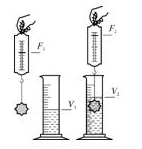在“验证阿基米德原理”的实验中,各实验小组同学选用恰当的器材,分别用图所示的实验方法测量了一些数据,并通过计算记录在表格中。
| 实验 序号 | 液体的密度(g/cm3) | 物体浸入液体的体积(cm3) | 浮力(N) | 物体排开的液体所受重力(N) |
| 1 | 1 | 20 | 0.2 | 0.196 |
| 2 | 1 | 40 | 0.4 | 0.392 |
| 3 | 1 | 60 | 0.6 | 0.588 |
| 4 | 1.5 | 20 | 0.3 | 0.294 |
| 5 | 1.5 | 40 | 0.6 | 0.588 |
| 6 | 1.5 | 60 | 0.9 | 0.882 |
。
(2)分析实验序号 中的相关数据可得出的初步结论是:当物体排开液体的体积相同时,液体密度越大,物体受到的浮力越大。
(3)甲小组同学分析了表中最后两列数据及相关条件认为这些实验数据能证明阿基米德原理,即浸在液体中的物体受到向上的浮力,浮力的大小 物体排开的液体所受重力。
(4)乙小组同学发现最后两列数据不相等,于是他们把表格中浮力一列的数据分别改成“0.196;0.392;0.588;0.294;0.588;0.882”,然后也得出了验证了阿基米德原理的结论。你认为乙小组的做法 (选填“正确”或“错误”),理由: 。

(1)同种液体,物体受到的浮力与物体排开液体的体积成正比。(2)1、4或2、5或3、6
(3)等于。(4)错误;要尊重实验数据,未经实验不得随意修改实验数据。
题目分析:浸在液体中物体所受的浮力大小与液体的密度和物体排开液体的体积有关,在探究过程中应用的方法是控制变量法。(1)分析实验序号1、2、3或4、5、6中前三列的实验数据,可得出的初步结论是同种液体,物体受到的浮力与物体排开液体的体积成正比。(2)在探究浮力大小与液体密度大小的关系时,应控制排开液体的体积相同,故选1、4或2、5或3、6。(3)由表中数据分析可知:浮力的大小等于物体排开的液体所受重力。(4)在进行实验过程中,应尊重实验数据,在误差允许范围内不得修改实验数据。故是错误的。
